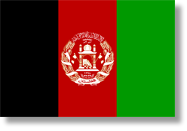
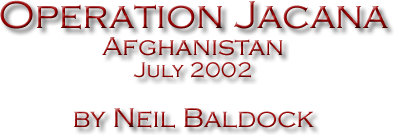
THE RECOVERY FROM BAGRAM FOB
"No European day jobs and offloads only." I'm sure that's what I wrote on my arrival form for Mobile duties. But having worked in UKMAMS Support, Standards and Training Flight for over 18 months I thought it would be nice to get out of the office and see what's going on in the big wide world. So I asked for a trip and got the Op Jacana recovery from Bagram Air base. The Royal Marines had been in Afghanistan for a good few months chasing the bad guys out of their mountain hideouts.
They had a lot of equipment and ammunition to recover, some of it had to go back to replenish the ships at sea, some was priority two freight that was going back to the UK by boat. All this stuff had to go via Oman and get in at the right time to meet the right vessel; both ships were docked at different times.
The new C130J cut it's teeth on it's first real operational tasking doing "Engine Running On-loads" in both Bagram and in Oman. It was to prove its worth during the out load. High Priority freight was chalked up and sent to Kabul for airlift back to the UK; a major exercise in load planning by both command and airhead staffs, in which communication was all-important.
Its good for SSTF get out and about on these Operations, we need to ensure that what we are teaching on the Mobile course is what the boys and girls are using and what they need and to show that we can still do it.
They had a lot of equipment and ammunition to recover, some of it had to go back to replenish the ships at sea, some was priority two freight that was going back to the UK by boat. All this stuff had to go via Oman and get in at the right time to meet the right vessel; both ships were docked at different times.
The new C130J cut it's teeth on it's first real operational tasking doing "Engine Running On-loads" in both Bagram and in Oman. It was to prove its worth during the out load. High Priority freight was chalked up and sent to Kabul for airlift back to the UK; a major exercise in load planning by both command and airhead staffs, in which communication was all-important.
Its good for SSTF get out and about on these Operations, we need to ensure that what we are teaching on the Mobile course is what the boys and girls are using and what they need and to show that we can still do it.
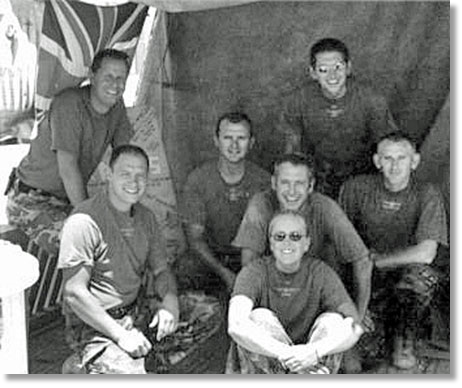
So there we were checking in at Brize Norton early one July morning in 2002, the flight down was uneventful, 99 Squadron did us proud on the way down, turned the lights off and let us sleep, no trolleys up and down aisles. During the night approach to Kabul the ALM appeared to work for Norwich Union and made a drama of putting paper plates over the windows, so the bad guys would not see our tactical red lights, a few flares were let off but we got down without incident.
On arrival at Kabul, the passengers due for Bagram were herded together and placed on the in-theatre Herc for the short journey up country. Low-level flight at night, with no paper plates to protect us; these guys should take some lessons from 99 Squadron. Bagram is pitch black, no white lights on the pan at all, don't walk off the tarmac, there are mines all over the place, wait here for a lift, the MAMS team will pick you up soon. Well the Herc they are dealing with was delayed, so I stood on the dark pan, surrounded by mines and bad guys for about half an hour until the MAMS rover finally comes out of the dark using NVG's. Find the tent, make your bed and get up for the first O group in three hours time.
O groups every morning. 0330Z, headed by a Royal Marine full colonel, he wants to know what moved in the last 24 hours, what's moving in the next 24, what's left to move and what problems you are facing. Good forum and everyone on the detachment was on side and there to help as required. It all went down hill after the O group. We had two sets of big forks at Bagram, that was it, the only ACHE available for a major weapons and general freight out load. Of course they both went U/S on the same day and we had pallet building to do by day, and inbound and outbound loads to do that night. This must be a DS inject, where is the TSO. Luckily the chain of command was kicked into action and they arranged a fresh Henley to be sent up from Kabul for us to break. Top tip of the day, don't load a 13 ton forklift on a ten ton drops rack and expect to use the drops rack ever again.
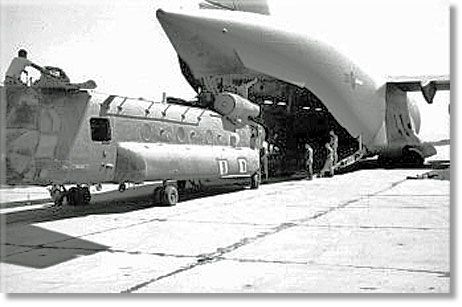
All the aircraft at Bagram were handled at night, due to the high threat and the extra payload it gave, we had to beg steal and borrow NVG kit to enable us to do our basic task. There was no white light allowed on the airfield at all, which made 6 pallet on and off load fun, with a forklift with doggy tilt rams it made it even more interesting.
We were able to turn round palletised aircraft, using one set of forks, in around 40 minutes with engines running. It goes a long way to enhance marshalling skills.
During the daylight hours, loads were prepared and built for that night. Most C130J aircraft left very close to the maximum payload of 14T, the J giving us far more flexibility with loads, as the rollers are far easier to remove and replace. When a K came in it only gave us a 9T payload and we had to understand that was pushing it, the crews would prefer less, I was educated that night I can tell you.
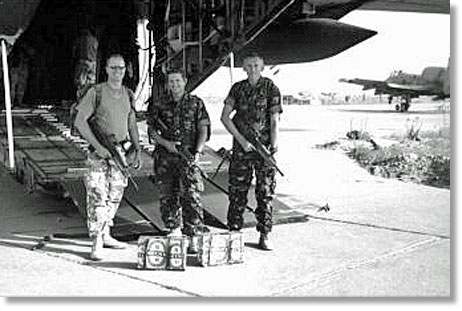
The working day often turned out to be some 22 hours long with all the meetings and O groups to go to. Role requirements were passed on daily basis to JF Log C, FMCC and TALC in Thumrait. Often the ALM would not get the message, and come in with full roller down for a flat floor load, luckily it is easier to put right on the J than the K, and apart from a few stools being thrown, aircraft were able to depart on time.
TALC needed someone who understands roles and loads rather than just jet plans and met working in there, as we were obviously speaking a foreign language to them.
TALC needed someone who understands roles and loads rather than just jet plans and met working in there, as we were obviously speaking a foreign language to them.
More and more as the detachment went on we were let down by our ACHE, it fell over every day and no one wanted to send us a qualified MTSS fitter, using in theatre REME guys, spares were asked for and bits robbed from Kabul. We begged favours to get our kit going, and when finally our MTSS fitter did arrive, with no spares or weapon, we found the REME had misdiagnosed the fault and we had demanded the wrong spares.
We had loads of great injects to put on the Mobile course, some one borrows, or rather steals your JCB and leaves it parked with two wheels in a mine field. Can you load an extra 17 aircraft pallets without increasing the airlift? Can you squeeze on a few motorbikes and quad bikes, oh and a few ton of weapons, it needs to go ASAP; we have not planned for it. Advise the Army and Marines on DAC preparation, then get officers running to you saying an Army private told them to wrap a battery, and I told them not to and showed them the reference. What do they do?
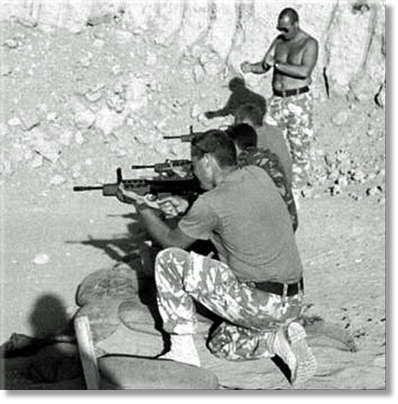
C17's started to arrive to take home the Chinook detachment, one was used bring in a tail plane for a U/S C130K. An unusual but very easy load to handle. The working nights got longer with the C17's on top of the standard C130's. It was far too hot and noisy to sleep during the day, so we arranged a range day to re zero our A2 rifles and have a play on the machine guns. The A2 was great in the extremely dusty conditions; it only jammed after 10 rounds not 8.
After the last C130 had been and gone, the camp was fully wound up and a convoy was put on to take the rear party and MAMS team to Kabul, we really did turn the lights out and close the gate, always wanted to do that. The drive down was nice, passed the minefields and burnt out tanks, through the endless poverty and begging into the destroyed city of Kabul. The Royal British Army had set up camp in an old factory, set up a bar where you could take your loaded gun for a beer and made you put your DP jacket on to go and hump boxes
As a UKMAMS detachment we received high praise from in-Theatre command staffs, who saw the pressure we were under and the output we generated. As the numbers of Marines decreased, the tents came down and accommodation was freed up. It was quality asbestos lined accommodation, which retained the heat of the day well and was miles away from all facilities, but it was home. We were so rich living there; we were washing in bottled mineral water.
After the Bagram detachment departed I stayed on to have a look around Kabul's set up and system. They had just an intense time of it, with the routine C17s and AN124's. On top of that they had the added pressures of coping with the Turkish Airforce and their ever-changing plans for the APOD. One day you would be able to park your ACHE and pallets in a certain position, the next it was a problem, move it again, and again, and again.
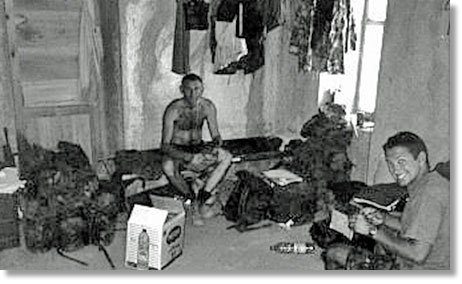
It was an eventful months detachment, made a change from the office, seeing the problems with ACHE and pallets first hand, loads built as on hand for a K will not be an on hand load for a C17. Problems needed addressing there and then, you need the right equipment to do the job and you need to look after it, with the right people. Try and implement foot and mouth control measures with no equipment or people in a desert, it's not easy.
The system is getting far better than it ever was at looking after us when we are away. Free phone calls home, you got issued a little disposable card with a pin number on, one card gave you 20 minutes a week. Internet cabins were available to enable you to E mail loved ones, if you get ever get the young marines out of the chat rooms to find a space on a machine. The food was excellent, gym facility's good and live TV links from the UK available. Our guys and girls all had the right attitude for the task in hand; they had the right training and worked hard, in the best traditions of UKMAMS. What's more they all enjoyed it and learned from it. As recoveries go it went well. Any ideas where we're going for the next Op?
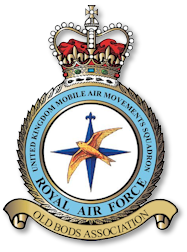
FLt Lt Gary Sadler, Neil Baldock, Eddie Knight, Chris
Hoskinson, Darren Mileham Gordon Baker, Sally John
Hoskinson, Darren Mileham Gordon Baker, Sally John


